The Science Behind Why Diets Don’t Work
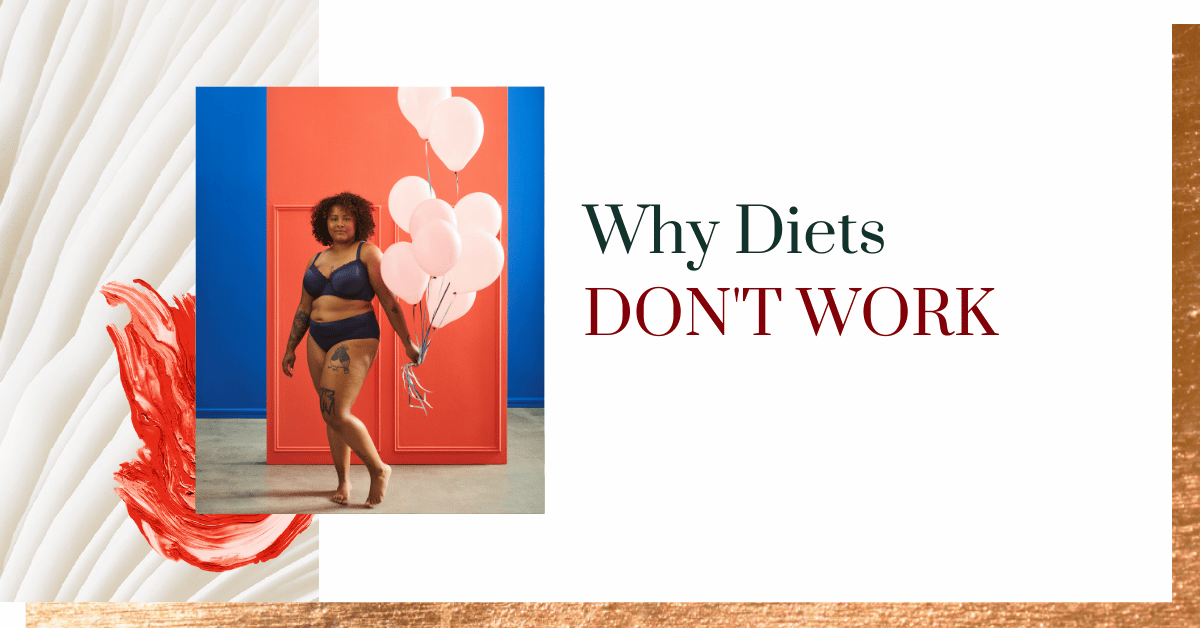
Each year, more than 50% of American adults try to lose weight. The diet industry in the United States makes more than $70 billion per year. (Yes, that is billion.) Yet research shows that diets don’t work: 90 to 97% of people who lose weight through dieting will regain it back within two to five years. Read on to find out the science behind why diets don’t work.
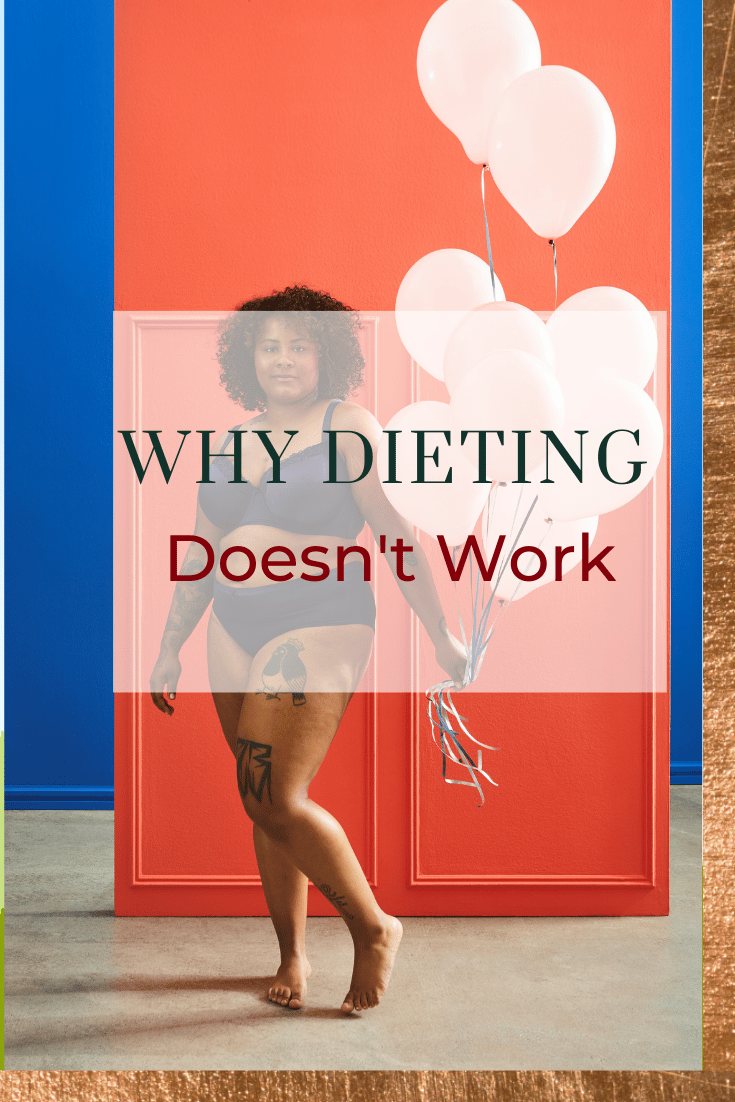
With revenue of over $70 billion per year, you’d assume that the dieting industry offers effective products. Yet at least 90 to 97% of people who lose weight through dieting will regain it within two to five years, which means that the vast majority most of the time, diets do not result in long-term weight loss.
(And hint: this is NOT your fault. Keep reading to find out why not.)
Despite all the ads that say otherwise, it is very rare for people to lose weight and keep it off “for good.” Not only that but one- to two-thirds of people who diet regain more weight than they originally lost, ending up at a higher weight than where they started.
A review of more than 30 long-term studies showed that going on a diet actually causes weight gain. The more diets someone has tried, the more they weigh. So, not only does dieting not work for long-term weight loss but it is also associated with increased risk of binge-eating, eating disorders, and long-term weight gain.
Weight-loss programs have more than a 90% failure rate, yet we continue to blame ourselves and our willpower rather than placing the blame where it really belongs: on the product (aka the diet) that doesn’t do what it’s advertised to do.
Diets Make People Unhealthier
Not only do diets fail at making us thinner but they also make us unhealthier. Dieting and intentionally trying to lose weight lead to food and body preoccupation, overeating and bingeing, lower self-esteem, weight cycling, and disordered eating behaviors and eating disorders.
A 2008 survey found that 65% of women aged 25 to 45 had some form of disordered eating, and another 10% met the criteria for eating disorders. That means that three out of four women eat, think about, or behave abnormally around food, including skipping meals, restricting major food groups, binge eating, and restrained or controlled eating.
Feelings of guilt and stress over food are also common. Dieting is the most common type of disordered eating.
Weight cycling, or repeated cycles of intentional weight loss followed by unintentional weight gain (also known as yo-yo dieting), is also very common among dieters. This pattern of repeatedly losing and regaining weight has a negative effect on a person’s health. It increases the risk of heart disease, high blood pressure, diabetes, chronic inflammation, certain forms of cancer, and even death.
Weight cycling is an independent risk factor for poor health outcomes, which means that losing and regaining weight is worse for a person’s health than staying at a higher weight. Not to mention that weight cycling may explain some, if not all, of the increased disease risk and poor health outcomes we see in people who have a higher BMI.
*It’s important to note that I am not saying weight gain itself is bad, nor is the inability to lose weight a problem. Despite what our society has programmed us to believe, fat bodies are not bad.
Why Diets Don’t Work
Diet culture likes to make you think that it is your lack of willpower that causes you not to be able to eat “correctly” or lose weight. It places the blame on the individual, saying that if only you had the self-control to eat “right,” then you’d be able to keep the weight off.
That idea couldn’t be further from the truth, yet the dieting industry wants people to believe this because it keeps them going back to dieting, which means more money in companies’ pockets.
If dieting really worked, then the entire dieting industry would tank overnight.
My anti-diet colleagues and I often say that our goal is to get to a place where we’re out of our jobs because it would mean that our society’s sexist, racist body ideals would be dismantled, and people would be able to be accepting of their bodies no matter what their size.
The reality is that the vast majority of people are unable to lose weight not because they lack willpower but because the human body is wired for survival.
Our bodies are much smarter than we give them credit for. We have a complex biological system that works to ensure we get enough food to stay alive.
When you restrict or limit certain types of food or cut back on the amount of food you eat, your body gets the message that you are starving, so it switches into survival mode. It doesn’t matter if you are surrounded by enough food to feed you for weeks. Your body is still biologically wired as it was centuries ago when food was truly scarce, and the ability to store extra calories as fat and burn fewer calories at rest was a genetic survival mechanism.
That means that now, any threat of restriction or food scarcity (like a new diet or setting food rules) feels to your body like starvation is coming. And when your body senses starvation, it does everything it can to try to keep you alive and to keep you within your set point weight range.
Your body does this in a variety of ways, including:
- Decreasing your metabolic rate (aka the number of calories your body needs each day to stay alive)
- Decreasing thyroid activity (which is involved in regulating metabolism)
- Decreasing levels of your fullness hormones
- Increasing levels of your hunger hormones
- Increasing your cravings for calorie-dense foods
The Deprivation-Binge Pendulum
To your body, dieting feels like starvation. Your body doesn’t want you to starve, or die, so it responds by increasing your appetite, lowering your fullness signals, and increasing your cravings, especially for energy-dense foods like those high in sugar and fat.
This happens even if you are not actively dieting. I often see people who say they’ve given up dieting but are still thinking like dieters—still conscious of everything they eat, still judging their food choices, still feeling bad when they feel they’ve eaten the “wrong” thing or “too much,” still trying to control themselves around food even if they’re not technically following a specific diet.
Although you may not be depriving yourself through traditional diets, the threat of future deprivation is implied when you aren’t letting yourself have certain foods, aren’t keeping all kinds of foods around, or feel guilty or ashamed about what you’re eating.
Your body gets the conscious or subconscious message, “Tomorrow, I’ll try not to do this again,” which your body hears as, “Better get food in now.” This type of sneaky diet mentality will cause the same outcome as traditional dieting: a bigger appetite and more food cravings.
Biologically, this makes sense: If you really were in a famine, energy-dense foods and an increased appetite would be a great way to save your life. But what ends up happening is you enter into the deprivation-binge pendulum:
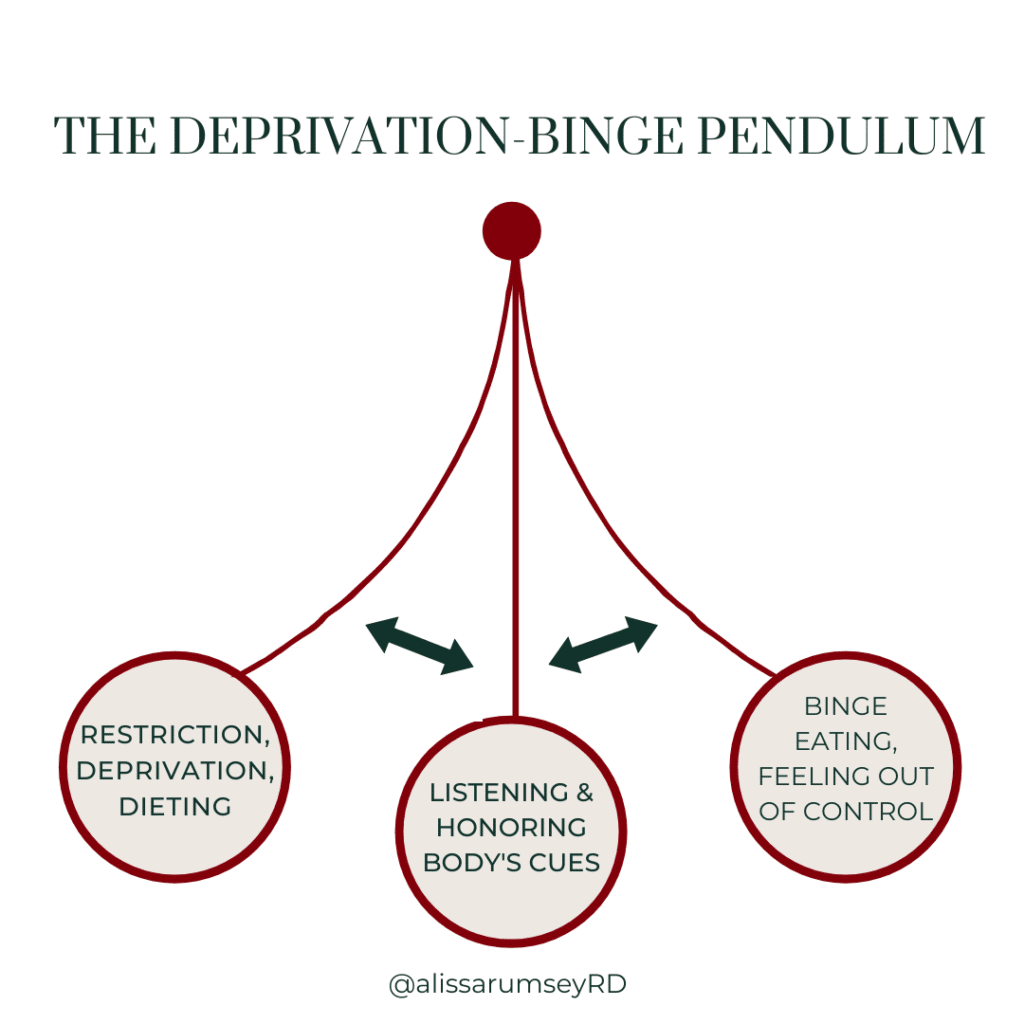
The Dieting Cycle
Another concept that helps to explain why diets don’t work is the dieting cycle, pictured below.
When you restrict certain foods or food groups, you may be able to avoid eating those foods for several days or even several weeks, but eventually, your body feels deprived.
This deprivation feels to your body like starvation, so you end up getting cravings, “breaking” the diet, and, often, overeating and bingeing.
This can cause you to feel out of control, ashamed, and guilty, and so, to regain control, you start dieting and restricting again. Which eventually leads to deprivation, breaking the diet, bingeing, followed again by guilt. And the cycle continues.
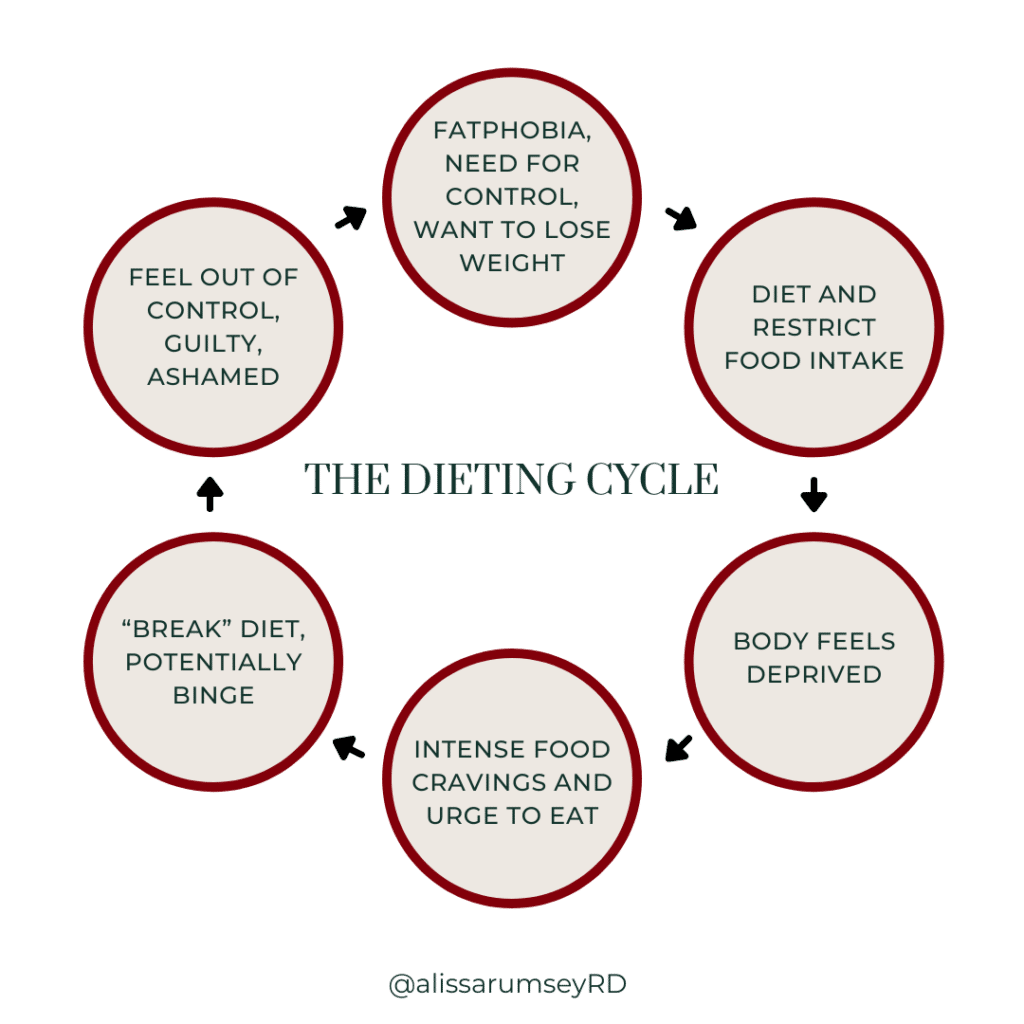
What To Do Instead of Dieting
Instead of dieting and trying to control or restrict your food intake, practice giving yourself permission to eat what you want.
This may sound scary – and counterintuitive – but remember, the reason you feel out of control around food is because of restriction. Once we take the restriction away – and replace it with permission – this allows for food habituation.
When you allow yourself to eat all sorts of foods and keep these foods around you, over time they become less exciting, and the desire to eat them diminishes.
One of my clients went through this with macaroni and cheese, a meal she had loved but kept mostly off-limits because she could never stop eating it and always ate to the point of being uncomfortably full. During our work together, she decided to permit herself to eat it whenever she wanted so she could work on habituating to it.
At first, she ended up having it three or four nights a week and often ate until she felt uncomfortably full, but she continued to keep it in the house and allow herself to have it. One day, after several weeks, she checked in with her body to see what she wanted to eat and realized, “Wow, mac and cheese doesn’t sound good right now!”
She had habituated to it. She still allowed it to be an option for meals, but she found that, after the first few weeks of eating a lot of it, she rarely wanted it. When she did choose to eat it, she was usually able to stop at the point of comfortable fullness, without exerting any control. To this day, several years later, she continues to keep mac and cheese stocked in her pantry to make sure it is always allowed and available.
Remember: your ability to “stick” to a diet has nothing to do with willpower and everything to do with the fact that diets don’t work and set you up to “fail”.
Looking for support to help you move away from dieting?
Check out my Unapologetic Eating 101 Course, an online, self-paced program to liberate yourself from dieting and make peace with food and your body.
My team and I also offer virtual one-on-one support – you can check out our virtual intuitive eating nutrition coaching packages.
My book, Unapologetic Eating: Make Peace with Food and Transform Your Life, is also a great resource that includes information, research, and reflection prompts to help you move away from dieting and come back home to your body, so you can live your most unapologetic, liberated life.
Author Bio
This article was written and reviewed by Alissa Rumsey, MS, RD, CSCS, a registered dietitian and Certified Intuitive Eating Counselor. She specializes in weight-inclusive care, intuitive eating, body image healing, mindfulness, self-compassion, and healing from chronic dieting, disordered eating, and eating disorders. Alissa holds a Bachelor’s Degree in Nutrition and Exercise Science, and a Master’s Degree in Health Communications, and is also an NSCA Certified Strength and Conditioning Specialist.
6 Comments
Leave a Comment
share the love

about
Alissa Rumsey, RD.
Alissa Rumsey, MS, RD, CDN, CSCS (pronouns she/her/hers) is a registered
dietitian, nutrition therapist, certified intuitive eating counselor, and the author of
Unapologetic Eating: Make Peace With Food and Transform Your Life. Alissa is
passionate about helping people reclaim the space to eat and live,
unapologetically.

A twice-a-month round-up of inspirational stories, lessons, practical tips and encouragement for living your most authentic, unapologetic life.
The Unapologetic Life
RECENT POSTS

The Unapologetic Life
A twice-a-month round-up of inspirational stories, lessons, practical tips and encouragement for living your most authentic, unapologetic life.






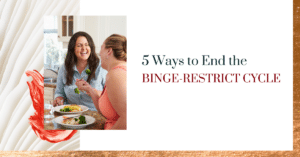

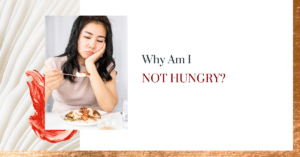
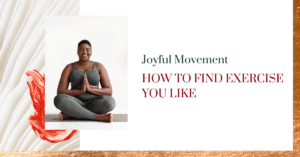
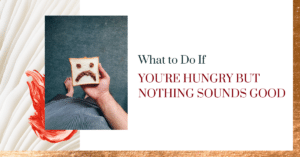
I absolutely love this post and agree completely with your anti-diet mindset! I love how you brought up the fact that going “on” a diet means one will eventually have to leave it behind – likely resulting in going back to one’s former eating patterns. Giving permission and honing in on intuitive eating are so key.
Thanks Kori!! I’m glad to hear it resonated with you 🙂
I’ve been trying to help my dad, who has very high cholesterol and stage 2 hypertension because of overweight. Problem is, he is “always hungry” and eats enormous amounts of food, all of which is either meat, fat, or starch. Is it inappropriate to tell him that he’s eating twice his needed calories, not to mention zero produce? He refuses to change, but in such cases, isn’t “eat less” or “eat different” sound advice?
Hi Cali, first of all, it’s wonderful that you are trying to help your dad. I can’t really give too much advice without hearing more and doing an assessment, but I would say to consider meeting your dad where he is at. You say he ‘refuses to change’ – but are there certain small things he may be willing to do? Like add a vegetable alongside his meal? Food issues run deep and telling someone to “eat less” – especially if they don’t know the root of why they overeat – won’t help. If he’s open to meeting with a dietitian I would highly recommend that!
Hi Alissa! I’m a nutrition student and would love to read the review you mentioned of 30 long term studies showing the dieting causes weight gain! I hope to work in the Intuitive Eating space and want to really understand some of the science behind it. Do you have a reference?
Thanks, Jill
Hi Jill – some great resources for the science behind why diets don’t work include:
-https://haeshealthsheets.com/resources/
-https://weightandhealthcare.substack.com/p/the-research-post
-This research review: https://jeffreyhunger.com/uploads/3/4/4/8/34481134/hunger_smith___tomiyama__2020__-_sipr.pdf
Best of luck with your studies! We need more clinicians working in the weight inclusive space 🙂